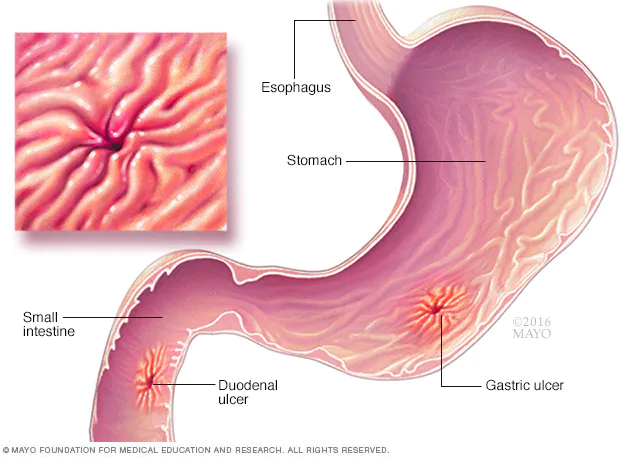Helicobacter pylori, also known as H. pylori, is a type of bacteria that infects the stomach and duodenum. It lives in the digestive tract and can damage the stomach’s protective lining.
Experts say it is the most common cause of Peptic Ulcer Disease (PUD), and that an untreated H. pylori infection can lead to complications.
According to Gurama A Gurama, a Fellow Doctor in Pharmaceutical Microbiology and Biotechnology at the Faculty of Pharmacy, Gombe State University, Helicobacter pylori causes a range of gastrointestinal diseases such as chronic gastritis, peptic ulcer disease, and gastric cancer.
He said, “Helicobacter pylori is a bacteria that is commonly found in the stomach lining and digestive system of humans. It is known to cause gastric inflammation, peptic ulcers, and in some cases, stomach cancer.
FG begins collection of helicopter landing levy, deploys 151 officers
Military widows launch bus scheme in Abuja
“The bacterium survives in the acidic environment of the stomach by secreting urease, which converts urea into ammonia, increasing the pH of the stomach environment around it. This helps the bacteria survive in the acidic environment of the stomach, and also neutralizes the stomach acid and allows the bacterium to colonize the stomach and damage the gastric mucosa. The bacterium also produces enzymes and toxins that cause inflammation and damage to the lining of the stomach.”
He explained that Helicobacter pylori infection can be diagnosed by tests such as breath tests, blood tests, stool tests, and endoscopy with biopsy.
He added that the management of Helicobacter pylori infection depends on the presenting symptoms of the patient and the severity of the infection.
The expert said the bacteria also produces a number of toxins, including vacuolating cytotoxin A (VacA) and cytotoxin-associated gene A (CagA). VacA causes cellular vacuolation, which leads to tissue damage, and CagA promotes the attachment of H. pylori to the surface of the stomach lining cells, causing inflammation and increasing the risk of cancer.
Gurama said H. pylori’s infection is mainly acquired during childhood, as it can spread from person to person from the ingestion of contaminated food, water, or through close contact with a carrier.
“Host genetic factors, environmental factors such as diet, and bacterial virulence factors, can all play a role in the pathogenesis of the infection and its progression toward gastric disease.
He said the treatment of Helicobacter pylori infection usually involves a combination of antibiotics and acid-reducing medications.
Antibiotics: The most common method for treating H. pylori is by using a combination of antibiotics. The antibiotics used to treat Helicobacter pylori include amoxicillin, clarithromycin, metronidazole, and tetracycline. Proton pump inhibitors (PPIs) such as omeprazole and lansoprazole are commonly used acid-reducing medications.
Proton Pump Inhibitors (PPIs): PPIs are often used in conjunction with antibiotics to help reduce gastric acidity, which can aid in reducing inflammation of the stomach lining.
Bismuth Subsalicylate: Bismuth subsalicylate is an oral medication that may be used in combination with antibiotics and/or PPIs to treat H. pylori infection.
Gurama said, “The most common therapy for Helicobacter pylori infection is a triple therapy consisting of a PPI and two antibiotics for 7-14 days. If this therapy fails, a quadruple therapy may be used, which involves a PPI, bismuth, and two antibiotics for 10-14 days.
“It is important to follow the treatment regimen as prescribed and complete the entire course of antibiotics. Failure to complete the treatment may lead to antibiotic resistance and treatment failure.”
He said alternatively there are several supplements that have been suggested to support the treatment of Helicobacter pylori infection. Here are some of them:
Probiotics: Probiotics are live bacteria that can help to restore the balance of gut bacteria and may improve H. pylori treatment outcomes.
Zinc-carnosine: A combination of the mineral zinc and the nutrient carnosine has been shown to have anti-H. pylori effects and may enhance the effectiveness of standard antibiotics.
Vitamin C: Vitamin C has been shown in studies to help reduce the growth of H. pylori and may improve the effectiveness of antibiotics.
Garlic: Garlic is a natural antibiotic and has been shown to have antimicrobial effects against H. pylori.
Mastic gum: Mastic gum is a resin obtained from the mastic tree and has been traditionally used for gastrointestinal ailments. Studies have found it to be effective against H. pylori.
Gurama said it is important to note that these supplements may not be a substitute for antibiotics or other medication prescribed by a healthcare professional.
He said, “Always consult with your doctor or a licensed healthcare practitioner before taking any supplements.

 Join Daily Trust WhatsApp Community For Quick Access To News and Happenings Around You.
Join Daily Trust WhatsApp Community For Quick Access To News and Happenings Around You.